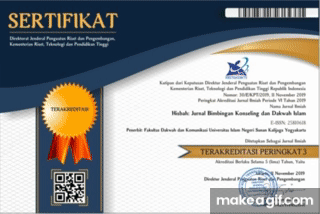KONSELING BEHAVIORISTIK DALAM MEMBENTUK PERILAKU MANDIRI MERAWAT DIRI PADA TUNAGRAHITA
DOI:
https://doi.org/10.14421/hisbah.2018.151-06Abstract
Mental retardation as a mental disability that affects the brain's working system intellectually, impaired motor sensors which resulted in limitation in living the life in social environment. This makes it difficult to mental retardation limitation to live independently, especially in taking care of yourself. From the background of the problem, the need for the formation of behavior in an effort to take care of yourself for mental retardation using the behavioristik approach to counseling, specifically using the technique of classical conditioning. The object of this writing is mental retardation along with analysis of the behavioristik counseling who became an settlement approach. The result of this writing recommends the use of behavioristik classical conditong as analysis counselling in helping form a mental retardation behavior of self help in caring for yourself.
Kata kunci: Mental retardation, behavioristik counseling, self-sufficiency taking care
of yourself
References
Aziza Meria. (2015). Model Pembelajaran Agama Islam bagi Anak Tunagrahita di SDLB YPPLB Padang Sumatera Barat. Tsaqafah Jurnal Peradaban, Vol. 11, No. 2, 2015.
Fatma Laili Khoirun Nida. (2014). Membangun Konsep Diri bagi Anak Berkebutuhan Khusus. Jurnal Tarbiyah STAIN Kudus, Vol. 2, No. 1, 2014.
Izzatur Rusuli. (2014). Refleksi Teori Belajar Behavioristik dalam Perspektif Islam. Jurnal Pencerahan, Vol. 8, No. 1, 2014.
Kartika Cahyani, Indah. (2016). Terapi Behaviour Terhadap Anak Retardasi Mental di SD Ainul Yakin Yogyakarta. Skripsi. Universitas Negeri Yogyakarta.
Mario M, Vasconcelos. (2004). Mental Retardation. Journal de Pediatria, Vol. 80, No. 2, 2004.
Michael J. Begab, ddk. (1984). Classification in Mental Retardation. American Association on Mental Deficiency. Washington DC: Kalorama Road.
Muh Basuni. (2012). Pembelajran Bina Diri Pada Anak Tunagrahita Ringan. Jurnal Pendidikan Khusus, Vol. IX, No. 1, 2012.
Muzdalifah M Rahman. (2016). Pendidikan Keluarga Berwawasan Gender Pada Anak Berkebutuhan Khusus di Kudus. Palastren, Vol. 9, No. 1, 2016.
Nandiyah Abdullah. (2013). Mengenal Anak Berkebutuhan Khusus. Magistra, No. 86 Th. XXV, 2013.
Novi Irwan Nahar. (2016). Penerapan Teori Belajar Behavioristik dalam Proses Pembelajaran. Nusantara (Jurnal Ilmu Pengetahuan Sosial), Vol. 1, 2016.
Peter Coleridge. (1997). Pembebasan dan Pembangunan: Perjuangan Penyandang Cacat di Negara-negara Berkembang (Terjemahan Omi Intan Naomi). Yogyakarta: Pustaka Pelajar.
Petra W. B. Prakosa. Dimensi Sosial Disabilitas Mental di Komunitas Semin Yogyakarta Sebuah Pendekatan Representasi Sosial. Jurnal Psikologi, Vol. 32, No. 2.
Sigit Sanyata. (2012). Teori dan Aplikasi Pendekatan Behavioristik dalam Konseling. Jurnal Paradigma, Vol. VII, No. 14, 2012.
Sribas Goswani. (2013). The Parental Attitude of Mentally Retarded Children. Global Journal of Human Social Science Arts & Humanities, Vol. 13, No. 1, 2013.
Titi Sunarwati Sularyo dan Muzal Kadim. (2000). Retardasi Mental. Sari Pediatri, Vol. 2, No. 3, 2000.
Titin Nurhidayati. (2012). Implementasi Teori Belajar Ivan Petrovic Pavlov (Classical Conditioning) dalam Pendidikan. JURNAL FALASIFA, Vol. 3, No. 1, 2012
Arikunto, Suharsimi. (2014). Prosedur Penelitian Suatu Pendekatan Praktik. Jakarta: Rineka Cipta.
Downloads
Published
Issue
Section
License
Authors who publish with this journal agree to the following terms:
- Authors retain copyright and grant the journal right of first publication with the work simultaneously licensed under a Creative Commons Attribution License that allows others to share the work with an acknowledgement of the work's authorship and initial publication in this journal.
- Authors are able to enter into separate, additional contractual arrangements for the non-exclusive distribution of the journal's published version of the work (e.g., post it to an institutional repository or publish it in a book), with an acknowledgement of its initial publication in this journal.
- Authors are permitted and encouraged to post their work online (e.g., in institutional repositories or on their website) prior to and during the submission process, as it can lead to productive exchanges, as well as earlier and greater citation of published work.











